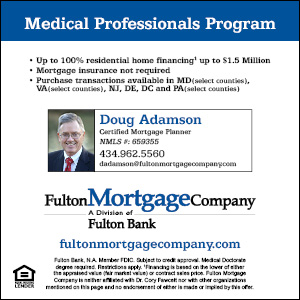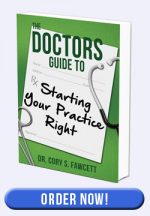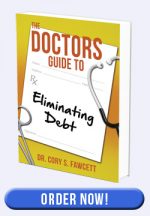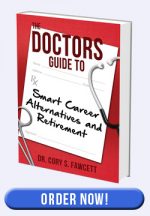So, you have settled into your first job as an attending physician. This is an exciting time with many big changes. You likely moved to a new city, had a significant pay increase along with a huge jump in responsibility. Now is the time to decide how to repay your student loans.
Whenever you have a drastic change in income, you should readjust your budget or spending plan. If you have never made a spending plan, now is a good time to start. A spending plan allows you to decide where the money you earn will go in order to meet your goals. One expense in your spending plan is your student loan repayment. You must have a good grasp of your income and expenses in order to know exactly how much money you can put towards loan repayments.
DO NOT MAKE A SIGNIFICANT LIFESTYLE INCREASE UNTIL YOUR STUDENT LOANS HAVE BEEN ELIMINATED!
When making your new spending plan, as much as possible, continue spending your money like you did while you were a resident and living on a smaller salary than you are earning. If you look at your new income and decide to start spending it all, there will be nothing left for accelerating your loan repayments. The next few months will set the path for your financial future. If you start off in the wrong direction, you will not reach your desired destination. Get the right start and you will lead a life of comfort, without financial worries. The wrong start will leave you struggling financially for decades.
You have likely already chosen where you will live. Hopefully, you chose a place that doesn’t eat up a big portion of your new income. This is not the time to purchase a big new house. If you already have purchased an expensive home, it will likely result in many additional years before you reach financial independence. But you might not have made other bad financial decisions yet like purchasing expensive new cars, boats, vacations, motorhomes, second homes……
Please consider putting off all luxuries until you have paid off your student loans. If you begin your attending life with a five year or less timeframe to pay off your student loans, you will have a much better future financially.
So how do you tackle those loans? Start by following these steps.
1: Since you have chosen your job, you know if you are eligible for public service loan forgiveness (PSLF). If you work for a non-profit organization, you are likely eligible. If you work for a private, for profit company, you are not eligible for PSLF and can skip down to #5.
2: Just because you are eligible for PSLF, doesn’t mean you should use it. First, if your student loans are small, you are better off to pay them off quickly and be done. The extra work that is required to be in the PSLF program will not be worth the reward. Second, you need to have made a significant number of reduced payments during residency for this to pay off. The longer your residency, the better the benefit of using PSLF. If, for example, you took a general surgery residency for six years, and then went through a two year thoracic fellowship, and you made reduced student loan payments during those eight years of training, then you only have two years left while making a higher payment on your attending salary before the loans will be forgiven. That will create a great return on your time and effort in participating in PSLF. If you never made any reduced payments during residency, then you are not likely to reap a great reward from PSLF even if you are eligible. This is because you still need to make payments for ten years before you can get forgiveness and your payments on an attending salary will not leave much if anything to forgive.
3: If you plan to go for PSLF then you should refinance all your private loans into a lower interest rate loan and put all your federal loans into the PSLF program using either the PAYE or REPAYE payment structure.
4: The portion of your loans that are private should be paid off rapidly after refinancing them and the portion of your loans that are federal should be paid off according to the PAYE or REPAYE schedule the government outlines. This will provide maximal forgiveness.
5: If you are not going to be using PSLF, then you should refinance all your student loans into a lower interest rate. If you have $400,000 of student loans at a 6.8% interest rate, then you are currently paying $27,200 a year in interest. If you refinance these loans at 2.8%, then you will decrease your interest payments to $11,200 a year. That is a savings of $16,000 in just the first year.
If you were to pay off the loans over five years, the 6.8% loan payments will be $7,882.79 a month and your total interest paid will be $72,967.39. The 2.8% loan will have monthly payments of $7,151.98 and the total interest paid will come to $29,118.83. The refinance will save you $730.81 on each monthly payment, totaling a $43,848.56 interest savings. If you are in the 40% tax bracket as an attending, you would need to earn just over $73,000 to pay that extra interest if you don’t refinance. That is a great return for the few hours it will take to refinance your loans.
If you do not make a jump in lifestyle up to your new income, then paying $7,151.98 a month on your student loans to retire them in five years will be an easy task on your new attending salary. If your gross pay is $250,000 a year, which is $20,833 a month, and you pay 40% in taxes on your new income (Fed + State + Payroll) then you will net $12,500 a month. After paying your $7,151.98 student loan payment, you will be left with $5,348.02 a month to pay for all your other living expenses. That is a net income of $64,176.24 which is likely higher than your gross income as a resident. You will be able to increase your lifestyle some and pay off your $400,000 student loans over the next five years. Then when the loans are paid, you will get a $7,151.98 a month net income raise. That is $85,823.76 a year to increase your lifestyle and/or boost your savings.
6: Special considerations for this year. Due to the pandemic, the government passed the Coronavirus Aid, Relief, and Economic Security Act (CARES). There are some provisions for student loans in that bill. No interest accrues or payments are due through September 30, 2020 on federal student loans. Currently, there is talk of possibly extending this date. The suspended federal loan payments will still count toward the 120 payments required for PSLF. Because of this change, you should take advantage of the free interest and no payments and not refinance any federal loans until after this grace period ends. So, if there is not an extension, then refinance in October. If the date is extended, then refinance after the grace period ends. Your private loans are not affected by this bill so refinance them now unless your lender has given you a grace period.
It is crucial that you use this first month as a new attending to set up a spending plan that starts you down the path of financial success. Take advantage of your big jump in income to get your financial house in order, don’t just boost your lifestyle. If you are not sure how you feel about paying off your loans early, get a copy of my book The Doctors Guide to Eliminating Debt. It will help you decide what speed to conquer your debts. I have not found anyone who regrets taking the quickest path to becoming debt free. I became debt free in 2001, including my home mortgage, and am very happy with that decision. It was key to allowing me to retire early.
If you want tips to establish a great life as a new attending, pick up a copy of my book The Doctors Guide to Starting Your Practice/Career Right. Whether you are employed or in private practice, this book will help you make the best early career decisions. The right start makes all the difference in you and your family’s future happiness.









